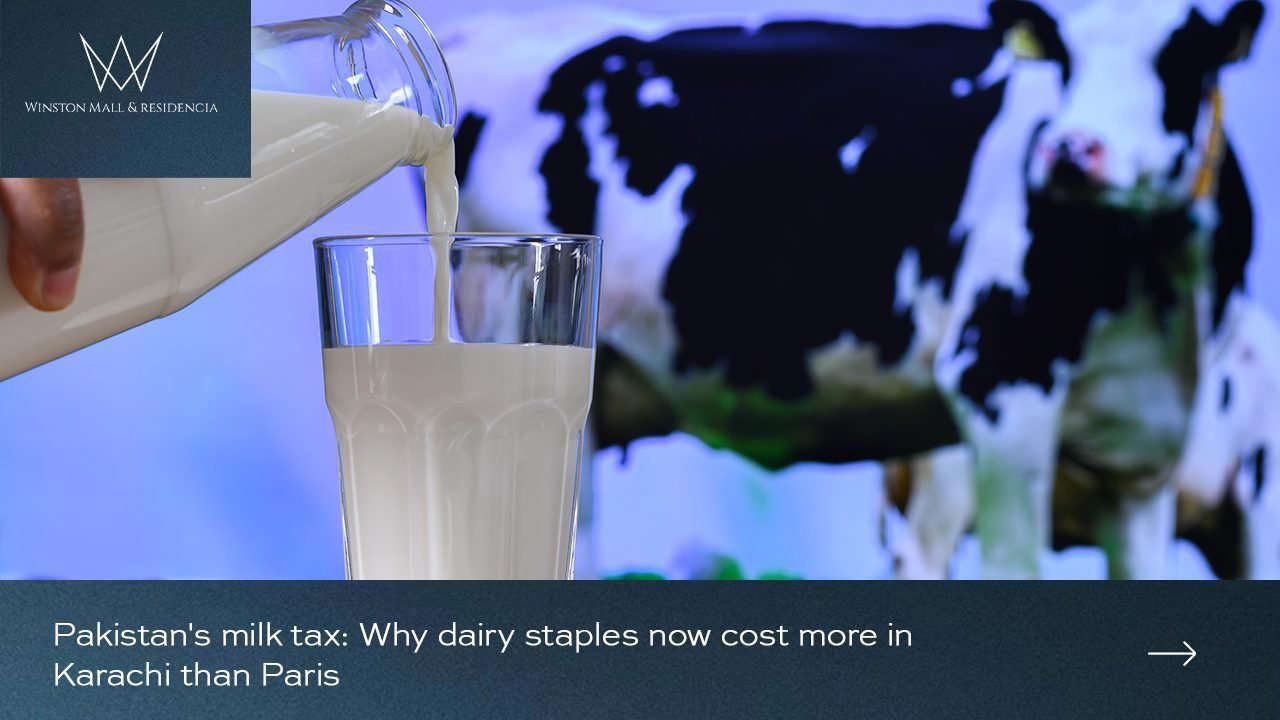Pakistan’s recent implementation of a milk tax has led to a surprising economic phenomenon: dairy staples now cost more in Karachi than in Paris. This development has significant implications for consumers, the dairy industry, and the broader economy. The new tax policy, aimed at increasing government revenue, has sparked debates about its effectiveness and impact on the average Pakistani citizen.
In Karachi, Pakistan’s largest city and economic hub, the price of milk has surged to unprecedented levels. This increase has outpaced even the cost of dairy products in Paris, a city known for its high cost of living. The stark contrast between these two vastly different urban centers highlights the complex interplay of taxation, economic policies, and local market dynamics.
The milk tax in Pakistan is part of a broader fiscal strategy to address the country’s economic challenges. However, its implementation has raised questions about the balance between government revenue needs and the welfare of citizens. Critics argue that the tax disproportionately affects lower-income families, for whom milk is a dietary staple and an important source of nutrition.
Supporters of the tax policy contend that it is necessary for improving Pakistan’s fiscal health and funding essential public services. They argue that short-term price increases may lead to long-term benefits for the country’s economy and infrastructure. However, this perspective is met with skepticism from those who are feeling the immediate impact of higher prices on their daily lives.
The Rising Cost of Essentials
Pakistan is facing a severe economic crisis, with the prices of essential items skyrocketing. Recent reports from The Express Tribune indicate that inflation rates for kitchen staples have doubled or tripled, putting immense pressure on consumers.
Ramzan Price Surge
During Ramzan, a traditionally challenging time for household budgets, prices spiked dramatically:
- Onions: From PKR 150 per kg to PKR 300 (with some relief at PKR 250)
- Cabbage: From PKR 80-100 to PKR 150 per kg
- Green chilies: From PKR 200 to PKR 320 per kg
Government’s Financial Strain
The Pakistani government, grappling with financial difficulties, has implemented a 40% tax increase in the annual budget. This move aims to meet International Monetary Fund (IMF) conditions for a new bailout. However, this taxation strategy has placed an additional burden on citizens already struggling with inflation.
Milk Prices: A Global Comparison
The recent surge in milk prices has caught international attention. Following the new tax implementation, milk prices in Pakistan have increased by over 20%. This increase has made dairy staples in Karachi more expensive than in cities like Paris, Melbourne, and Amsterdam.
Reference Website: First Post
Public Reaction
Citizens have expressed their frustration on social media:
- One user on X wrote: “Bone-breaking inflation is on its peak! Milk prices in Pakistan have surged by more than 20% following the imposition of a new tax, making the dairy staple more expensive in Karachi than in Paris, Melbourne, and Amsterdam.”
- Another commented: “Milk prices in Pakistan surged by more than a fifth after a new tax was applied, making the dairy staple more expensive than in France, Australia and some other developed nations. Great going.”
Impact on Public Health
With approximately 40% of Pakistan’s population living in poverty, the surge in essential prices is likely to have severe consequences for public health, particularly among children.
Government Response
Finance Minister Aurangzeb acknowledged public concerns, stating: “I completely understand the stress that people from different sectors feel about additional taxes; I completely empathise and sympathise, but we need to work for it (IMF bailout).”
Economic Context
According to an April report by the Asian Development Bank (ADB), Pakistan currently has the highest cost of living in all of Asia. This economic pressure is felt acutely by citizens like Karachi shop owner Abdul Hameed, who criticized the government for “neglecting the needs of the common people” in a report by ANI.
The Health Impact of Pakistan’s Milk Tax
Pakistan’s recent implementation of an 18% tax on locally produced infant formula milk and baby food has ignited significant controversy. This decision has drawn sharp criticism from both industry representatives and the public, raising concerns about its potential consequences on child health and nutrition.
Concerns Over Infant Nutrition
Critics of the new tax policy argue that the increased costs could lead to severe repercussions for infant and child nutrition. There are fears that parents, faced with higher prices, might resort to less nutritious feeding alternatives for their children. This shift could potentially worsen the already critical issue of malnutrition among Pakistan’s youngest population.
Malnutrition Crisis in Pakistan
The tax comes at a time when Pakistan is grappling with a serious malnutrition crisis. The country’s ‘under-five mortality rate’ stands at an alarming 137 per 1,000 births, far exceeding international standards. This statistic underscores the gravity of the situation and the potential risks associated with policies that could affect access to essential nutrition.
National Nutrition Survey Findings
Data from the National Nutrition Survey paints a concerning picture of child health in Pakistan:
- 40% of children are underweight
- Over half of the children suffer from stunting
These figures highlight the existing challenges in ensuring adequate nutrition for Pakistan’s youth, making the potential impact of the new tax even more concerning.
Industry and Public Response
The decision has been met with strong opposition from various sectors. Industry representatives have voiced their concerns about the potential long-term effects on child health. The public, too, has expressed worry about the affordability of essential nutrition for infants and young children.
Balancing Fiscal Needs and Public Health
While the government’s aim to increase revenue is clear, the chosen method has sparked a debate about prioritizing fiscal goals versus public health. The tension between these objectives presents a complex challenge for policymakers and citizens alike.



